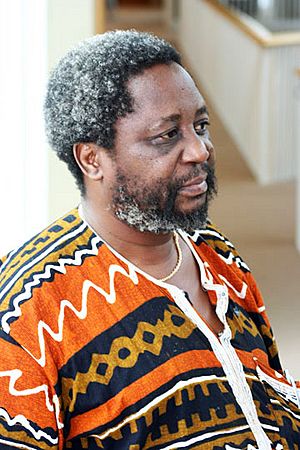Chenjerai Hove facts for kids
Quick facts for kids
Chenjerai Hove
|
|
|---|---|

Hove in 2007
|
|
| Born | 9 February 1956 Mazvihwa, near Zvishavane, Rhodesia |
| Died | 12 July 2015 (aged 59) Stavanger, Norway |
| Occupation | Poet and writer |
Chenjerai Hove (born February 9, 1956 – died July 12, 2015) was a famous writer from Zimbabwe. He was a poet, wrote novels, and essays. He wrote in both English and Shona, which is a language spoken in Zimbabwe. His stories often looked at the challenges and changes people faced in rural areas during Zimbabwe's fight for independence. He passed away in 2015 while living in Norway.
Contents
Life of Chenjerai Hove
Early Life and Education
Chenjerai Hove was born on February 9, 1956. His father was a local chief. He grew up in a place called Mazvihwa, near Zvishavane. This area was part of what was then known as Rhodesia. Rhodesia later became the country of Zimbabwe.
He went to school at Kutama College and Marist Brothers Dete. These schools were in the Hwange district of Zimbabwe. After finishing school, he studied in Gweru. He then became a teacher. Later, he earned degrees from the University of South Africa and the University of Zimbabwe.
Career and Writings
Besides being a teacher, Chenjerai Hove also worked as a journalist. He wrote for many publications. He even contributed to a collection of poems called And Now the Poets Speak. He regularly wrote for The Zimbabwean. This was a newspaper that started in 2005 and often shared different views from the government.
Chenjerai Hove's novels are known for being modern in style. However, they also use many traditional storytelling methods. His books deeply explored the emotional and social costs of the Rhodesian Bush War. This war was Zimbabwe's fight for freedom. He especially focused on how the war affected people in the countryside.
Life in Exile and Legacy
Chenjerai Hove was a critic of the government led by Robert Mugabe. Because of his views, he had to leave Zimbabwe. He lived in exile, which means living outside your home country, often for political reasons. At the time of his death, he was living in Stavanger, Norway. He was part of a program for writers who need a safe place to live.
Before living in Norway, he had visiting positions at other universities. These included Lewis & Clark College and Brown University in the United States. He also spent time as a poet-in-residence in Miami. Chenjerai Hove's works were translated into many languages. These included Japanese, German, and Dutch. He won several awards for his writing. One of his most important awards was the 1989 Noma Award for Publishing in Africa. He died on July 12, 2015, and his death was due to liver failure.
Awards and Recognitions
Chenjerai Hove received many honors and awards for his important work. These awards recognized his talent and his brave voice.
- 1983: Special Commendations for the Noma Award for Publishing in Africa, for his book Up in Arms
- 1984: Became the first President of the Zimbabwe Writers Union
- 1988: Won the Zimbabwe Literary Award, for his novel Bones
- 1989: Won the Noma Award for Publishing In Africa, for Bones
- 1990: Became a founding board member of the Zimbabwe Human Rights Association (Zimrights)
- 1991–94: Was a Writer-in-Residence at the University of Zimbabwe
- 1994: Was a Visiting Professor at Lewis & Clark College in Portland, Oregon, USA
- 1995: Was a Guest Writer for Yorkshire and Humberside Arts and Leeds University in the UK
- 1996: Was a Guest Writer for the Heinrich Böll Foundation in Germany
- 1998: Won Second Prize in the Zimbabwe Literary Award, for his book Ancestors
- 2001: Received the German Africa Prize for his writings that supported freedom of expression
- 2007-08: Was an International Writers Project Fellow at Brown University
See also
 In Spanish: Chenjerai Hove para niños
In Spanish: Chenjerai Hove para niños
 | William M. Jackson |
 | Juan E. Gilbert |
 | Neil deGrasse Tyson |

